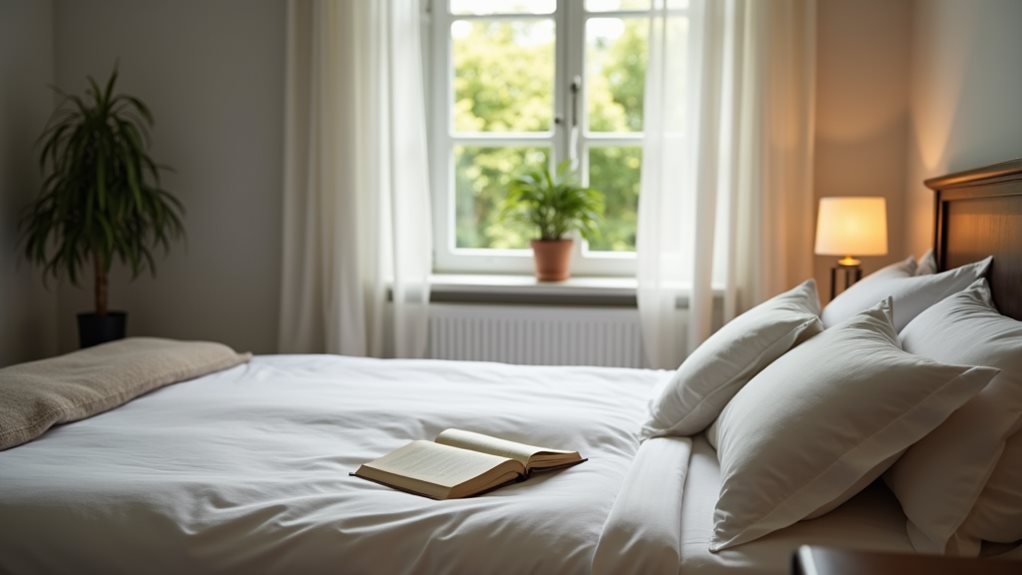
Adopting a positive mindset serves as a powerful tool to improve sleep quality. By fostering calm thoughts and eliminating anxieties around bedtime, individuals can create a peaceful passage to sleep. Techniques such as deep breathing, cognitive behavioral therapy, and designing a conducive sleep environment further assist in reducing bedtime stress. Cultivating positive thoughts about rest enhances mental and emotional well-being, providing a foundation for healthier sleep patterns and overall life satisfaction. For those struggling, exploring these strategies may offer considerable benefits.
Key Takeaways
- Cultivate a positive outlook on sleep, using affirmations like "I will have a restful sleep tonight" to foster a good mindset.
- Implement consistent bedtime routines to signal your body it's time to wind down and prepare for sleep, reducing bedtime anxiety.
- Practice mindfulness meditation to clear your mind of anxious thoughts and promote relaxation, aiding in a smoother transition to sleep.
- Use stress reduction techniques such as deep breathing or progressive muscle relaxation to alleviate daily tensions before bedtime.
- Create a calming bedroom environment with soothing colors and scents, enhancing the overall sleep experience by fostering tranquility.
Understanding the Connection Between Mindset and Sleep
Although many factors influence sleep quality, the connection between mindset and sleep is particularly crucial. An individual's mental state can heavily impact their ability to fall asleep and maintain restful sleep.
Those who experience sleep anxiety often find themselves trapped in a cycle of worry that disrupts their bedtime routine. Cultivating a positive mindset can considerably alter this pattern. By approaching bedtime with a calm and positive outlook, individuals can create a more conducive environment for sleep.
Implementing a consistent bedtime routine also supports a positive mindset, thereby enhancing overall sleep quality and reducing the occurrences of sleep disturbances.
The Role of Stress Reduction Techniques in Enhancing Sleep
Given the strong link between stress and sleep disruption, stress reduction techniques play an essential role in enhancing sleep quality.
Deep breathing, for instance, activates the body's relaxation response, important for mitigating the day's tensions. By focusing on slow, deliberate breaths, individuals can greatly decrease their stress levels, paving the way for deeper sleep.
Additionally, mindfulness meditation encourages a state of awareness and presence, which helps in recognizing and releasing anxious thoughts. This practice not only quiets the mind but also promotes a peaceful shift to sleep, making these techniques critical tools in achieving a restful night.
Cognitive Behavioral Therapy: A Tool for Better Sleep

Cognitive Behavioral Therapy (CBT) emerges as a powerful tool in improving sleep by addressing the psychological barriers that prevent restful nights.
By implementing various CBT techniques, individuals learn to modify the thoughts and behaviors that disrupt sleep, leading to improved sleep hygiene. This therapy encourages the establishment of a consistent bedtime routine and the elimination of activities that hinder sleep.
Through methods like progressive muscle relaxation and guided imagery, CBT helps to diminish anxiety and foster a calm mindset conducive to sleep.
How to Create a Sleep-Inducing Environment
Creating a sleep-inducing environment is essential for enhancing the quality of sleep, serving as a fundamental component in the pursuit of restorative rest.
Ideal bedroom colors, such as soft blues and warm grays, play a vital role by lowering heart rates and creating a tranquil atmosphere. Additionally, incorporating calming scents like lavender can greatly aid in reducing stress and promoting relaxation.
These elements together foster a sanctuary ideal for sleep. Analyzing the impact of sensory experiences on sleep quality reveals that both visual and olfactory cues are instrumental in preparing the mind and body for a deep, rejuvenating sleep cycle.
The Benefits of a Positive Sleep Mindset

While establishing a sleep-inducing environment is a significant step towards better rest, equally important is cultivating a positive mindset about sleep itself.
Embracing positive affirmations and sleep visualization can profoundly influence one's sleep quality. By affirming beliefs such as "I will have a restful sleep tonight," individuals set a mental foundation for relaxation and recovery.
Sleep visualization techniques, where one imagines themselves in a peaceful scenario conducive to sleep, can further enhance this relaxed state.
These practices not only reduce bedtime anxiety but also reinforce a healthy sleep pattern, leading to improved overall well-being and mental health.
Frequently Asked Questions
How Does Diet Impact Sleep Quality and Mindset?
Diet impacts sleep quality greatly. Consuming sleep-inducing foods, such as those rich in tryptophan, can enhance rest. Conversely, excessive caffeine consumption often disrupts sleep patterns, undermining a positive mindset and overall sleep quality.
Can Listening to Music Before Bed Improve Sleep?
Like a gentle lullaby, various music genres can soothe the mind into slumber. Curated sleep playlists may greatly enhance sleep quality, creating a tranquil auditory environment conducive to deep and restorative rest.
What Are the Effects of Exercise on Sleep Patterns?
Exercise intensity can considerably affect sleep patterns. Higher intensity may enhance sleep duration and quality, promoting deeper rest phases. Regular, moderate exercise is generally recommended for maintaining consistent, restorative sleep cycles.
How Do Different Seasons Affect Sleep Quality?
Seasonal changes affect sleep quality through temperature fluctuations and varying daylight hours. Cooler temperatures generally enhance sleep quality, while prolonged daylight in summer can disrupt sleep patterns, leading to less restful nights.
Are There Specific Vitamins That Promote Better Sleep?
Vitamin D and magnesium supplements are often recommended for improving sleep quality. Additionally, adjusting melatonin dosage and consuming herbal teas can also help enhance sleep, promoting a more restful and rejuvenating night's rest.
Conclusion
In summary, embracing a paradigm shift towards a positive and relaxed mindset emerges as a linchpin in revealing the secrets of restorative sleep. By weaving together stress reduction techniques, cognitive-behavioral therapy, and a tranquil sleep environment, individuals can greatly refine their nocturnal patterns. This holistic approach not only enhances sleep quality but also enriches one's overall mental and emotional well-being, illustrating that the journey to better sleep is both a science and an art.



